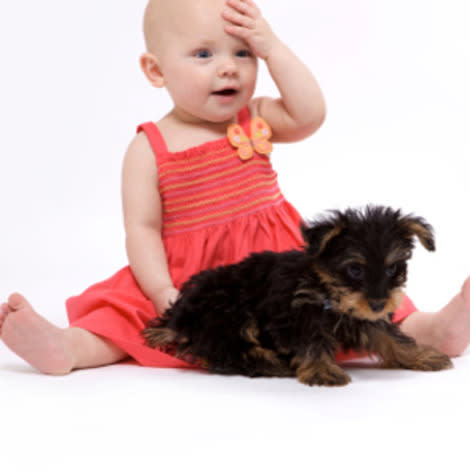How to Baby-Proof Your Pet (and Pet-Proof Your Baby)
No, you don't have to say good-bye to your dog or cat once you have a baby, but you do have to take some safety precautions. Take notes -- these steps are super-important for pet/baby harmony.
By Lisa Milbrand for TheBump.com

Introduce them slowly
Your pet sees your home as his turf, so don't expect him to immediately accept your baby into it. "It can take two to three months for a dog to accept a new animal into a home, so you should assume the same for an infant," says Sam Basso, a professional dog trainer and behaviorist in the Phoenix area.
Ease the transition by introducing them slowly -- this can help head off territorial behavior. "Greetings are extremely important for a dog to distinguish welcome visitors from unwelcome intruders," says Basso. Start by bringing the dog to a neutral place, far from his territory -- like a local park -- and letting him sniff the baby's blanket, and showing the baby to him. Once your dog seems comfortable, you can move to step two, which is running through that same scenario over again right outside your house, before you bring baby into the home.
The cutest baby and pet photos ever!
Give your pet a hideaway
A stressed dog could act out, so give him his own baby-free zone. "Having his own spot where children are instructed to leave him alone will encourage your pet to go there when he has had enough play and needs a break," says Lynn Buzhardt, DVM, veterinarian and coauthor of Can We Have One?: A Parent's Guide to Raising Kids With Cats and Dogs. It doesn't have to be anything elaborate -- a cozy cat bed too high for little hands to reach or a favorite corner of a room with a soft blanket.
Model the right behavior
Pets can get a lot of (usually unintentional) abuse from small children. Teach your child the right way to treat animals in more ways than just saying "no," when he's yanking your pet's tail and ears. "Teach children how to interact with the animal by modeling it for them and helping them practice," says Dr. Buzhardt. If your child hits the cat, take her hand and show her how to gently stroke its fur. Explain why they need to touch animals gently; even if your dog is a gentle giant, learning this can help a child be safer when encountering dogs on the street or friends' pets on playdates.
The ultimate babyproofing checklist
Give your pet plenty of exercise
Pretty much everything will revolve around baby, but don't forget to give Fido the exercise and care he needs. "If a dog is neglected, it can get jealous of the baby, or become overly focused on the baby," says Basso. If you're too exhausted to keep up with your usual walk or play schedule with your pet right now, cut yourself some slack -- see if you can get a friend to stop by and take your dog out for a stroll, or a neighborhood kid to play with your cat and some toys. "If you need a place to put the dog on those days when you are exhausted, a local doggie day care is ideal," Basso suggests. "The dog is getting exercised and socialized, and is getting more general stimulation -- which means the dog will be calmer and easier to deal with."
Never leave them alone together
It doesn't matter if your dog has the sweetest disposition or your kitty won't hurt a fly -- never, ever leave your baby or toddler and pet alone in a room together. "If the parent leaves the room, either the animal or the baby goes with him," Dr. Buzhardt says. (We know it's hard, but it's important!) It will be years before your child will be able to handle the pet on his own.
© 2012 The Bump. All rights reserved.
More from TheBump.com
Top 10 fears of new moms
Worst parenting advice ever heard!
10 ways your home is making you infertile
Why you hate your husband (after baby arrives)
Have a newborn? Chat with other new mommies
